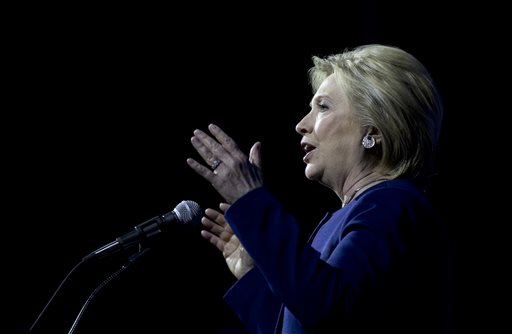Clinton and coal: Giving the industry its soundbite
March 14, 2016 by Ken Ward Jr.Democratic presidential candidate Hillary Clinton and Democratic speaks at the Ohio Democratic Party Legacy Dinner at the Greater Columbus Convention Center in Columbus, Ohio, Sunday, March 13, 2016. (AP Photo/Carolyn Kaster)
Well, it’s pretty clear that the coal industry got a potentially valuable soundbite last evening from Democratic presidential candidate Hillary Clinton. Secretary Clinton was asked to “make the case to poor whites who vote Republican why they should vote for you and your economic policies” and in offering one example, Secretary Clinton explained:
I’m the only candidate which has a policy about how to bring economic opportunity using clean, renewable energy as the key, into coal country. Because we’re going to put a lot of coal miners and coal companies out of business. And we’re going to make it clear that we don’t want to forget those people.
Those people labored in those mines for generations, losing their health, often losing their lives to turn on our lights and power our factories. Now we’ve got to move away from coal and all of the other fossil fuels. But I don’t want to move away from the people who did the best they could to produce the energy that we relied on.
As my friend Jim Bruggers at the Courier-Journal in Louisville points out, part of Secretary Clinton’s comment — “…We’re going to put a lot of coal miners and coal companies out of business” — sounds a lot like then-candidate Barack Obama’s remark in 2008 about how he would “bankrupt the coal industry“. Of course, the industry and its Republican friends have continued for years to take now-President Obama’s comments out of context. As I wrote during the 2008 campaign:
During a Jan. 17 interview with the Chronicle’s editorial board, an editorial writer noted that Obama co-sponsored a bill to encourage turning coal into liquid fuel for vehicles, an approach energy experts warn would likely create more greenhouse emissions than traditional gasoline. The editorial writer asked Obama how he squared his support for coal with the need to do something about climate change.
Obama responded that the country needs to “figure out how we can use coal without emitting greenhouse gases and carbon,” and that he believes a “cap-and-trade” emissions program is the best way to do that.
Such a program would put an overall ceiling on greenhouse gas emissions. Companies would need “allowances” from regulators for every ton of carbon dioxide their facilities pump into the atmosphere. Companies could reduce their emissions to meet the caps. Or they could buy or trade for “allowances” to keep using older facilities.
“That would create a market in which whatever technologies are out there being presented, whatever power plants are being built, they would have to meet the rigors of that market, and the ratcheted down caps that are imposed every year,” Obama told Chronicle editors. “So if somebody wants to build a coal power plant, they can, it’s just that it would bankrupt them because they’re going to be charged a huge sum for all that greenhouse gas that’s being emitted.”
Industry officials and Republicans are already jumping on this:
And really, it’s hard to blame them. Secretary Clinton gave her political opponents — the entire Democratic party’s political opponents — a great soundbite here.
Yes, when they start using only that one sentence, it will be greatly taking Secretary Clinton’s remarks out of context. Yes, she was speaking within the context of her proposals (see here and here) — similar to those put forth by the Obama administration — to help struggling coalfield communities with money to aid in economic diversification planning, cleaning up environmental messes and ensuring pensions and health-care benefits for retired miners.
Let’s also remember that, like President Obama, Secretary Clinton has been slow to come around to the idea that coalfield communities were struggling and that the federal government might want to try to do something to help (see here and here for more on that). Like so many political leaders who aren’t really in tight with the coal industry, Secretary Clinton tried to sound out the issue by talking this game about “clean coal” and when that didn’t work pivoted to the idea of helping out the region, but for a while refused requests for more information about exactly what that meant.
Of course, the media aren’t going to help Secretary Clinton here. Look at the way the Dallas Morning News played her comments on both the coal and natural gas industries.
In the end, though, it’s just wrong to try to blame coal’s problems entirely on President Obama, or the Sierra Club, or solely on efforts to rightly do something about climate change. As we’ve written time and again (see here and here), there is a much more complicated mix of issues at play: Cheap natural gas, competition from other coal basins, the decline in the steel industry here and abroad, and the playing out of the best coal in Southern West Virginia.
A bottom line that will certainly be missed by a lot of people is that Secretary Clinton’s right when she says that the Republicans really don’t have any plan for dealing with the coalfield crisis — except to blame it on Obama and the EPA and pass silly laws that weaken mine safety standards with a false promise that doing so will reverse the industry’s decline.
Explaining all of this is a bit of a heavy lift in today’s political campaigns. It would be an easier task for the Democrats in West Virginia if they hadn’t been in control for so long and played coal’s game, pretending the gravy train would never end instead of planning more carefully and completely for this day. Probably wouldn’t hurt either if their national candidates didn’t talk about coal miners with phrases like “those people.”

 Subscribe to the Coal Tattoo
Subscribe to the Coal Tattoo

